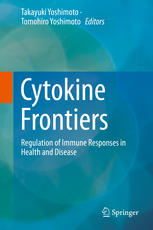

Most ebook files are in PDF format, so you can easily read them using various software such as Foxit Reader or directly on the Google Chrome browser.
Some ebook files are released by publishers in other formats such as .awz, .mobi, .epub, .fb2, etc. You may need to install specific software to read these formats on mobile/PC, such as Calibre.
Please read the tutorial at this link: https://ebookbell.com/faq
We offer FREE conversion to the popular formats you request; however, this may take some time. Therefore, right after payment, please email us, and we will try to provide the service as quickly as possible.
For some exceptional file formats or broken links (if any), please refrain from opening any disputes. Instead, email us first, and we will try to assist within a maximum of 6 hours.
EbookBell Team

4.0
76 reviewsThis book guides the reader through the latest research on the cytokine network, covering signaling pathways, control of the immune response, and potential therapeutics. Different cytokines stimulate diverse responses in various phases of inflammation and immunity, including the innate immune response, the generation of effector T cells, and the development of antibodies by the humoral immune system. It is now clear that the pathophysiology of many infectious, autoimmune, allergic, and malignant diseases can be largely explained by which cytokines are induced and subsequently regulate the cellular responses. In clinical medicine, cytokines are involved in a wide spectrum of diseases. This book describes in three parts the properties and roles of 15 key cytokines under physiological and pathological conditions. Part I presents nine cytokines associated with inflammatory disorders, pro-inflammatory cytokines, and the recently identified new helper T (Th) subset: Th17 cells. Part II gives details of three cytokines associated with allergic disorders, including Th2 responses and recently identified types of innate cells. Part III describes three cytokines that are associated with immunological tolerance and anti-inflammation, including regulatory T (Treg) cells, IL-10-producing Treg (Tr1) cells, and inducible IL-35-producing Treg (iTr35) cells. Cytokines are considered to be important as therapeutic targets for specific agonists or antagonists in numerous immune and inflammatory diseases. The ultimate goal of this book is to facilitate the development of therapeutic treatments for such diseases which has been limited by an insufficient understanding of the biology of cytokines and the complicated network that they create.